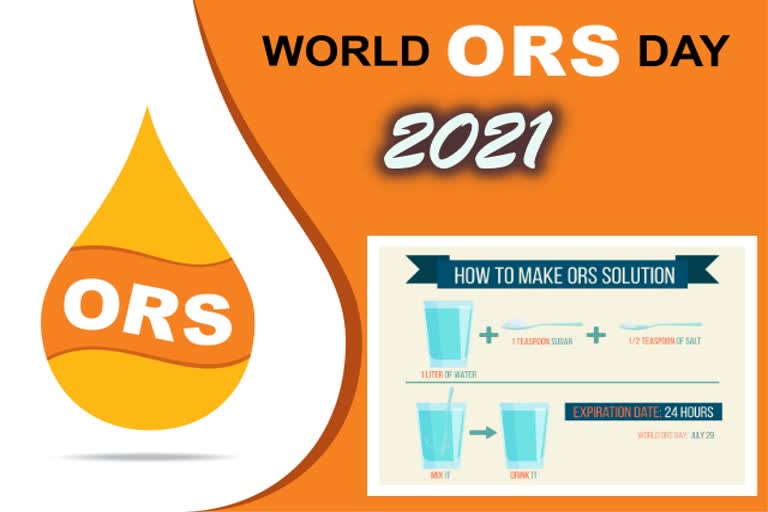According to WHO, Diarrhoeal disease is the second leading cause of death in children under five years old.
Advantages Of ORS
- Easy to use
- Cost-effective
- Home counterparts are available
- Readily available at primary health centers free of cost
- Needs no sterilization
- More physiological
Different Types of ORS
- Low Osmolarity ORS:
It is a type of oral rehydration solution that lowers the incidence of stool by 30% and vomiting by 20%. It is more tolerable by the system as it helps in reducing the amount of glucose and sodium in the solution without any adverse side effects. Moreover, low osmolarity ORS lowers the need for intravenous fluids.
- Tri-Sodium Citrate ORS:
This type of ORS with citrate is beneficial in treating acidosis, which often develops with dehydration. Trisodium citrate enhances the intestine's capacity to absorb more sodium and water. Glucose added in this ORS solution mainly helps in the absorption of sodium and not as a source of fuel. It has a longer shelf life and is highly recommended ORS therapy by WHO and UNICEF.
- Rice-Based ORS:
Rice-based ORS is particularly helpful in patients with a high purging caused due to cholera. It significantly reduces the stool output by 40% due to diarrhea or cholera and offers more glucose to counteract the loss of glucose together with carbs. It is also the most widely accepted type of ORS in some parts of the globe. Studies have also revealed that other varieties of starch like maize and wheat may also render similar results, without increasing the osmolarity of the solution.
- Home Based ORS
Home-based ORS works as the first line of preventive solution recommended to any patient who exhibits mild signs of dehydration. This solution is highly effective in preventing dehydration and maintains the nutritional status by restoring fluid balance and food intake. Furthermore, this helps the patients in not losing excess amounts of fluids before getting proper medical care.
- Super ORS:
Super ORS are special kinds of ORS where instead of mono sugars it comprises of more complex sugars and trace amounts of zinc. It may be food-based such as rice or starch-free like glycine/alanine-based or glucose polymer-based. Some of the benefits of using Super ORS include it improves rehydration, lessens stool frequency and duration, offers more nutritional support, helps in gaining weight, prevents secondary disaccharide intolerance, replenishes fluid balance, and strengthens the immune system.
How does ORS help with Diarrhea?
During Diarrhea, one loses all the electrolytes and minerals present in their body, leading to severe dehydration. This dehydration caused by Diarrhea is treated by giving extra fluids to the affected person at home or by providing the person with a glucose-electrolyte solution called Oral Rehydration Salts (ORS) solution.
The combination of increased home fluids and the use of ORS is an effective treatment for children suffering from diarrhea. A child is advised to consume ORS when they complain of three or more loose stools in a day.
What is an ORS solution?
ORS is a power-boosting glucose-electrolyte solution that helps in regaining lost electrolytes. The World Health Organisation states that ORS needs to have four basic ingredients which are then dissolved in one liter of clean drinking water. These ingredients are:
- 3.5 grams of sodium chloride (common salt)
- 2.9 grams of trisodium citrate, dihydrate
- 1.5 grams of potassium chloride
- 20 grams of glucose (sugar)
These ORS solutions are available in the market but if you do not have access to these you can make it at home by adding six teaspoons of sugar (1 teaspoon = 5 grams) and half a teaspoon of salt in one liter of clean water. Boil the water before using it.
How does ORS work in the body?
It is commonly known that ORS solution helps in the rehydration of the body but there is a vast mechanism of action behind it.
Normally, in healthy intestines, there is a constant exchange of water through the walls of the intestines. Up to 20 liters of water is discharged and then reabsorbed by the intestines every 24 hours. This allows the metabolites (components formed during the metabolism of food) to get absorbed into the bloodstream.
When a person has Diarrhea, this balance of water gets disturbed. More water is discharged from the intestines than is reabsorbed, which leads to a net loss in the amount of water the body needs. Not only water but a large amount of sodium is also lost during this time. The human body stores sodium (available in the form of sodium ions Na+) in body fluids and blood plasma, whereas 98% of the body's total potassium (K+) is stored within cells (intracellular).
The concentration of sodium should be in proper limits to maintain the functions of the body. Normally the kidneys regulate the amount of sodium in the body, however, in a state of dehydration, the sodium regulation is not effective. Thus when the Diarrhea is continuous, there is a rapid depletion of water and sodium. If more than 10 percent of the body's fluid is lost, the patient can die.
This is how the dehydration of the body is relieved completely within a couple of hours.
Also Read: Food Poisoning: Timely Treatment Helps


